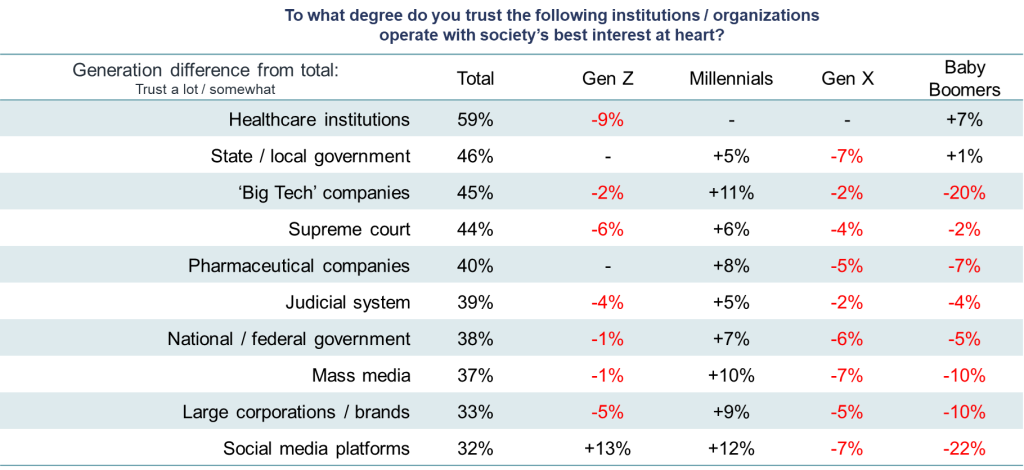It’s no secret; we are living in uncertain times.
Today’s news is filled with stories of inflation, interest rate increases, layoffs, (especially at tech companies), the reality of a recession, and the impact of our latest mid-term elections. That’s a lot for anybody.
At Shapiro+Raj, we decided to take a ‘pulse of the American Citizen.’ We reached out to a representative sample last week, to get their perspectives on a wide range of issues – from their economic outlook to the biggest stressors in their life. What behaviors they will continue and what will fall by the wayside.
In all of this, one theme stood out to us.
Trust.
The world trusts America. That’s the foundation of our leadership and the strength of our dollar. This is why we expect our citizens to trust the federal government as our representative, especially to operate in our society’s best interest. Unfortunately, this is not true. There is a clear erosion of trust in the Fed’s ability to do what’s right for us. It’s not only the Federal Government that is untrustworthy. They no longer trust social media platforms, large corporations and their brands, mass media, and the judicial system (the Supreme Court is still trusted a bit more +5 pts) than the rest.
Ironically, healthcare institutions are the most trusted ones that care about society’s best interest. Could it be bolstered by the pandemic? No other institution garners even half of the public’s trust. And the number of consumers who find their trust in these institutions declining outpaces those whose trust is increasing.

As social scientists and brand strategists, we find the comparison between traditional governmental institutions and broader business institutions intriguing. It is clearly not only governmental institutions that consumers are losing faith in. They trust large corporations / brands even less than they trust our federal government! Only a third of our citizens believe large brands operate in society’s best interest. Brands need to be concerned as younger generations expect brands to do more than deliver a product or service. They expect them to be purpose-driven and make decisions that deliver societal benefits beyond just bottom-line financials.
The other big a-ha is the fact that social media platforms, like Facebook, Twitter, Instagram, WhatsApp, are losing credibility. The on-going discussions around content moderation, fake news proliferation, and the general upheaval have taken a toll on their credentials. The ‘stay neutral’ stance that many social platforms have taken clearly isn’t working – consumers don’t believe sitting on the sidelines is acting in society’s best interest. Given the Twitter acquisition and Elon’s behaviors, consumer’s reticence is not surprising.
This is a dilemma brands will have to wrestle with – while social media offers tremendous reach and potential, if it is increasingly distrusted by consumers, might that rub off on brands who advertise there?
Is there a Generational Difference?
As we diagnosed this data, we were clearly looking to see where the erosion of trust was happening. Was it the cynical younger generations? Was it the Boomers? Could it be the Gen Z’s? Turns out, Baby Boomers and Gen X’ers are leading the decline. Gen Z is a bit more discriminating in their approach – slightly more trusting of some aspects and less of others. Yet, across all aspects, Millennials place more trust in institutions than any other generation. They are the lighthouse across all aspects and stakeholders.

Social media platforms and healthcare institutions are particularly interesting examples. Social media platforms are the least trusted overall and have the greatest distinction across generations with incredible distrust from Boomers, while younger generations are slightly more optimistic. While not as extreme, the reverse pattern is true of healthcare institutions – greatest trust overall fueled by Boomers while Gen Z is most skeptical. This is based on the depth of personal experience with the healthcare system. Gen Z has less personal experience with healthcare institutions than their Boomer counterparts. On the flip side, Gen Z has grown up and been responsible for adopting, evolving, and embracing new social media platforms like TikTok and Instagram. Which is why the older generations, Boomers, and Gen X’s rate these so much lower.
The one generational cohort that continues to surprise, are the Millennials. They are a more trusting, optimistic, and open-minded generation that are the bridge between Gen X and Gen Z.
As they live life and gain living experiences, they are not as jaded as the generations that have preceded them. They also see the potential for good in institutions that Z’s may not be mature enough to understand yet. One thing is certain, for the government, companies, media, and every ecosystem that supports them, this is the time to deeply understand how to gain their trust. If they do, you will be able to shape a successful future. If not, they will be washed away in the ebbing and eroding tide of trust.
This is a wake-up call.
Every institution, every company, every brand, and every governmental organization needs to see this as a huge wake-up call! Americans no longer trust ‘leaders’ and ‘institutions’ to do the right thing for them but more importantly, their communities. They don’t believe that these organizations work for our society’s best interests. This lack of trust needs to be addressed.
We would love to continue the dialogue. We have a POV on this. But we would love to hear your thoughts. Do you agree with our findings? Are you concerned? Do you have ideas / recommendations to address?
We would love to engage in this dialogue. Feel free to write at [email protected].


